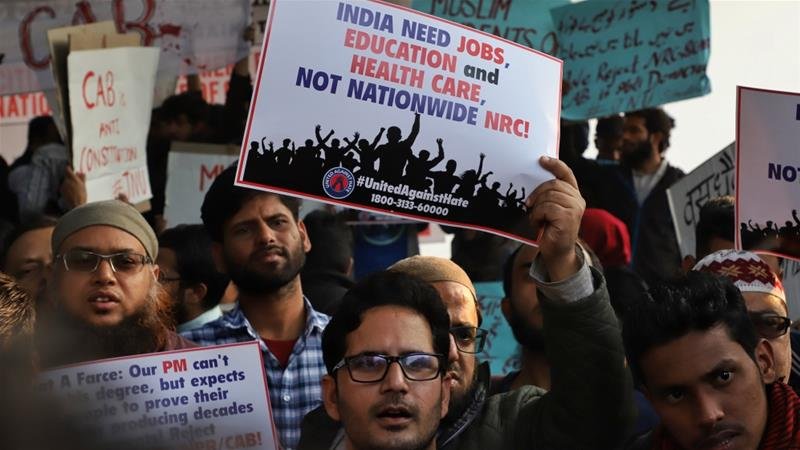What is the Citizenship (Amendment) Bill?

citizenship bill
The Bill looks to alter The Citizenship Act, 1955 to make Hindu, Sikh, Buddhist, Jain, Parsi, and Christian unlawful transients from Afghanistan, Bangladesh, and Pakistan, qualified for citizenship of India. As it were, the Bill expects to make it simpler for non-Muslim migrants from India’s three Muslim-larger part neighbors to become residents of India.
Under The Citizenship Act, 1955, one of the necessities for citizenship by naturalization is that the candidate more likely than not lived in India during the most recent a year, just as for 11 of the past 14 years.
The correction loosens up the second prerequisite from 11 years to 6 years as a particular condition for candidates having a place with these six religions, and the previously mentioned three nations.
Under The Citizenship Act, 1955, an individual who is conceived in India, or has Indian parentage, or has lived in India over a predetermined timeframe, is qualified for Indian citizenship.
Unlawful transients can’t become Indian residents. Under the Act, an unlawful vagrant is an outsider who: (I) enters the nation without substantial travel reports like identification and visa, or (ii) enters with legitimate archives, however, remains past the allowed timeframe.
Illicit vagrants might be placed in prison or ousted under The Foreigners Act, 1946 and The Passport (Entry into India) Act, 1920.
Be that as it may, in 2015 and 2016, the administration absolved determined gatherings of unlawful vagrants from arrangements of the 1946 and 1920 Acts. They were Hindus, Sikhs, Buddhists, Jains, Parsi’s, and Christians from Afghanistan, Bangladesh, and Pakistan, who arrived at India at the very latest December 31, 2014.
This implied these specific classifications of illicit transients would not be extradited or imprisoned for being in India without legitimate records.
The Citizenship (Amendment) Bill, 2016 was acquainted in Parliament with revising The Citizenship Act, 1955, so these individuals could be made qualified for citizenship of India.
What occurred with the Bill?
The Bill was postponed in Lok Sabha on July 19, 2016, and was alluded to a Joint Parliamentary Committee (JPC) on August 12, 2016. The Committee presented its report on January 7, 2019, and, the next day (January 8, 2019), the Bill was passed in Lok Sabha.
With the sixteenth Lok Sabha approaching the finish of its term, the administration was attempting to beat the clock to present it in Rajya Sabha. Notwithstanding, monstrous fights against the Bill in the Northeast acted to control the administration, and Rajya Sabha suspended sine kick the bucket on February 13, 2019, without the Bill being postponed.
As per Parliamentary methods, all Bills that have been passed by Lok Sabha however not by Rajya Sabha slip by when the term Lok Sabha closes.
The Citizenship Amendment Bill as well, in this way, slipped by.
The Bill is currently liable to be presented over again in the Winter Session. It should be passed by the two Houses to turn into a law.
What is the debate around the Bill?
The principal analysis of the Bill has been that it explicitly targets Muslims. Pundits contend that it is violative of Article 14 of the Constitution, which ensures the privilege of equity.
The administration, in any case, keeps up that the Bill plans to give citizenship to minorities who have confronted strict abuse in Muslim-greater part remote nations. BJP pioneers, including Prime Minister Narendra Modi, have discussed this Bill as correcting the wrongs of history by giving shelter to the children and little girls of “Mama Bharti”, who were left stranded by Partition.
In the Northeastern states, the possibility of citizenship for huge quantities of unlawful Bangladeshi transients has activated profound tensions, including fears of statistic change, loss of job openings, and disintegration of the indigenous culture.
Nearly the whole Northeast was wracked by monstrous fights for over a month paving the way to the foreseen presentation of the Bill in Rajya Sabha prior this year.
The BJP has, be that as it may, consistently underlined its assurance to get the Bill.
Home Minister Amit Shah has connected the section of the Bill with an across the country National Register of Citizens (NRC), recommending that regardless of whether the Assam NRC failed in forgetting about some non-Muslims, the Citizenship (Amendment) Bill would fix the mistake.





